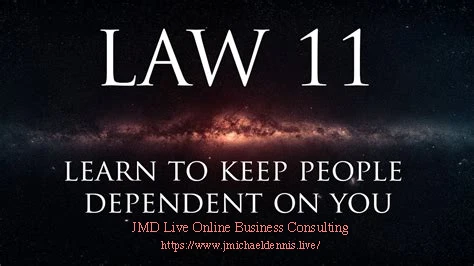“To maintain your independence, you must always be needed and wanted. The more you are relied on, the more freedom you have. Make people depend on you for their happiness and prosperity and you have nothing to fear. Never teach them enough so that they can do without you.”
Necessity rules the world. People rarely act unless compelled to. If you create no need for yourself, then you will be done away with at first opportunity. If, on the other hand, you make others depend on you for their welfare, if you can counteract their weakness with your own "iron and blood," then you will survive your masters. You will have all the benefits of power without the thorns that come from being a master.
The ultimate power is the power to get people to do as you wish. When you can do this without having to force people or hurt them, when they willingly grant you what you desire, then your power is untouchable. The best way to achieve this position is to create a relationship of dependence. The master requires your services; he is weak, or unable to function without you; you have enmeshed yourself in his work so deeply that doing away with you would bring him great difficulty, or at least would mean valuable time lost in training another to replace you. Once such a relationship is established you have the upper hand, the leverage to make the master do as you wish.
Do not be one of the many who mistakenly believe that the ultimate form of power is independence. Power involves a relationship between people; you will always need others as allies, pawns, or even as weak masters who serve as your front. The completely independent man would live in a cabin in the woods, he would have the freedom to come and go as he pleased, but he would have no power. The best you can hope for is that others will grow so dependent on you that you enjoy a kind of reverse independence: Their need for you frees you.
Make others dependent on you. To get rid of you might spell disaster, even death, and your master dares not tempt fate by finding out. There are many ways to obtain such a position. Foremost among them is to possess a talent and creative skill that simply cannot be replaced.
You do not have to have the talent of a Michelangelo; you do have to have a skill that sets you apart from the crowd. You should create a situation in which you can always latch on to another master or patron but your master cannot easily find another servant with your particular talent. And if, in reality, you are not actually indispensable, you must find a way to make it look as if you are. Having the appearance of specialized knowledge and skill gives you leeway in your ability to deceive those above you into thinking they cannot do without you. Real dependence on your master's part, however, leaves him more vulnerable to you than the faked variety, and it is always within your power to make your skill indispensable.
This is what is meant by the intertwining of fates: Like creeping ivy, you have wrapped yourself around the source of power, so that it would cause great trauma to cut you away. And you do not necessarily have to entwine yourself around the master; another person will do, as long as he or she too is indispensable in the chain.
To make others dependent on you, one route to take is the secret intelligence tactic. By knowing other people's secrets, by holding information that they wouldn't want broadcast, you seal your fate with theirs. You are untouchable. Ministers of secret police have held this position throughout the ages: They can make or break a king. But the role is so full of insecurities and paranoia that the power it provides almost cancels itself out. You cannot rest at ease, and what good is power if it brings you no peace?
One last warning: Do not imagine that your master's dependence on you will make him love you. In fact, he may resent and fear you. But, as Machiavelli said, it is better to be feared than loved. Fear you can control; love, never. Depending on an emotion as subtle and changeable as love or friendship will only make you insecure. Better to have others depend on you out of fear of the consequences of losing you than out of love of your company.
EXCEPTION TO THE RULE
The weakness of making others depend on you is that you are in some measure dependent on them. But trying to move beyond that point means getting rid of those above you; it means standing alone, depending on no one.
No such independence comes without a price. You are forced to isolate yourself. Monopolies often tum inward and destroy themselves from the in ternal pressure. They also stir up powerful resentment, making their enemies bond together to fight them. The drive for complete control is often ruinous and fruitless. Interdependence remains the law, independence a rare and often fatal exception. Better to place yourself in a position of mutual dependence, then, and to follow this critical law rather than look for its reversal. You will not have the unbearable pressure of being on top, and the master above you will in essence be your slave, for he will depend on you.
Michel Ouellette JMD, ll.l., ll.m.
JMD Live Online Subscription link.
J. Michael Dennis, ll.l., ll.m.
Business & Corporate Strategist
Systemic Strategic Planning
Quality Assurance, Occupational Health & Safety, Environmental Protection, Regulatory Compliance, Crisis & Reputation Management
Skype: jmdlive
Email: jmdlive@jmichaeldennis.live
Web: https://www.jmichaeldennis.live
Phone: 24/7 Emergency Access
Available to our clients/business partners


